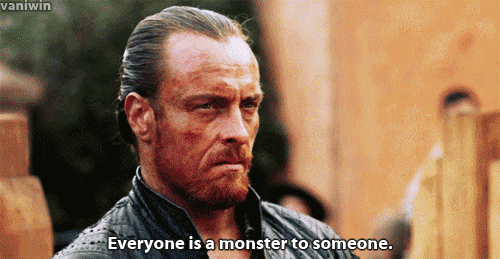Spoilers for all 3 seasons of Black Sails
Possibly no other show to date embraces the idea of moral grey and the age of anti-heroes more than Black Sails. Just about every character makes a living off of morally questionably behavior. If not pirates themselves, they sell their goods. Or they take their money in brothels. Or oppose them through brutal violence just as bad as the criminals they hate. In theory, creating likeable characters in such a world should be near impossible. A show where everyone is a criminal sounds like the kind of cynical edginess that drives the viewer to not care about anyone, instead focusing on the violence and shocks to entertain them.
Black Sails avoids this dilemma by creating their monsters piece by piece, so you understand just how they ended up that way. It shows how just about anyone can be considered a monster to someone else. Just like real life, the distinction between right and wrong blurs based on the life someone has lived and the obstacles they face. Black Sails manages that blurred line remarkably. And this makes for one of the strongest casts of compelling characters I’ve seen on any show.
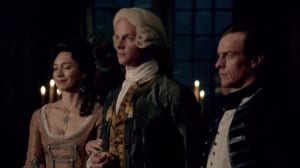
To the rest of the world, the pirates of Nassau are undoubtedly monsters. They live to disrupt law and the colonization efforts bringing civilized society to the New World. They rob hard-working businesses of their goods and destroy their property. If they don’t get what they want, they kill to take it. In the eyes of the British and Spanish the pirates of Nassau have taken a promising colonial location and corrupted it entirely. And they won’t stop until the same lawlessness spreads to every corner of the world.
Nassau in reality does not buck this villainous view entirely. After all, it is a town built on piracy. Its government officials have been corrupted. They do rob and murder innocents to take their goods. What gets lost in the tale, though, is the motivation involved, and why these pirates take up such a life. Here is where this show excels (especially starting with season 2). Black Sails tells the story of these pirates in such a way that they no longer appear the villains.
Take the show’s main character, Captain James Flint. A man who once represented the exact law and order he now rebels against. Once a promising lieutenant in the British Royal Navy by the name of James McGraw, he was assigned to help a noble named Thomas Hamilton rid Nassau of pirates. He believed them to be monsters, and was ready to defeat them by force. So how in the world did he end up as the most vicious, infamous pirate defending Nassau?
Pretty simple, actually. The British proved themselves bigger monsters to the man than the pirates of Nassau.
This happened specifically because of Thomas Hamilton and his wife Miranda. An idealistic and self-righteous pair, they did not want to take Nassau by force. Thomas insisted that the pirates were good people, that they would listen to reason. If approached with pardons and allowed to become part of civilized society in a reformed Nassau, the issue could be solved peacefully. Thomas believed deeply in the good of mankind. And over time, he convinced James McGraw of the same. Together, the Hamiltons not only made a believer of him, they fell in love with him, and vice versa. And for that, Thomas was imprisoned, McGraw stripped of his position in the Navy, and he and Miranda forced to flee.
As Captain Flint, McGraw never lost hope in a better Nassau. He lost hope in the British. They betrayed him, killed the man he loved, and forced him and the woman he loved away. Even so late as the end of season 2, Flint never stopped believing in Thomas’s dream. The season’s finale sees him approach an old friend, Peter Ashe, to rekindle the embers of that old dream. Ashe had once worked alongside Flint and Thomas to enact their plan for pardons. Despite a new, vicious reputation as a pirate killer, Flint believed his old friend still capable of helping. He is ready to confess to everything in order to secure pardons for Nassau and reintroduce British rule.
Instead he is betrayed, yet again, by England. So he and his fellow pirates make them pay. They take the city walls, turn their cannons on the gathered crowd waiting for Flint to hang, and start indiscriminately killing. Even after escaping to his ship, when he can easily escape, Flint decides instead to turn his warship’s considerable firepower on the city to destroy, in his words, “Whatever’s left.”
And destroy Charles Town they do.
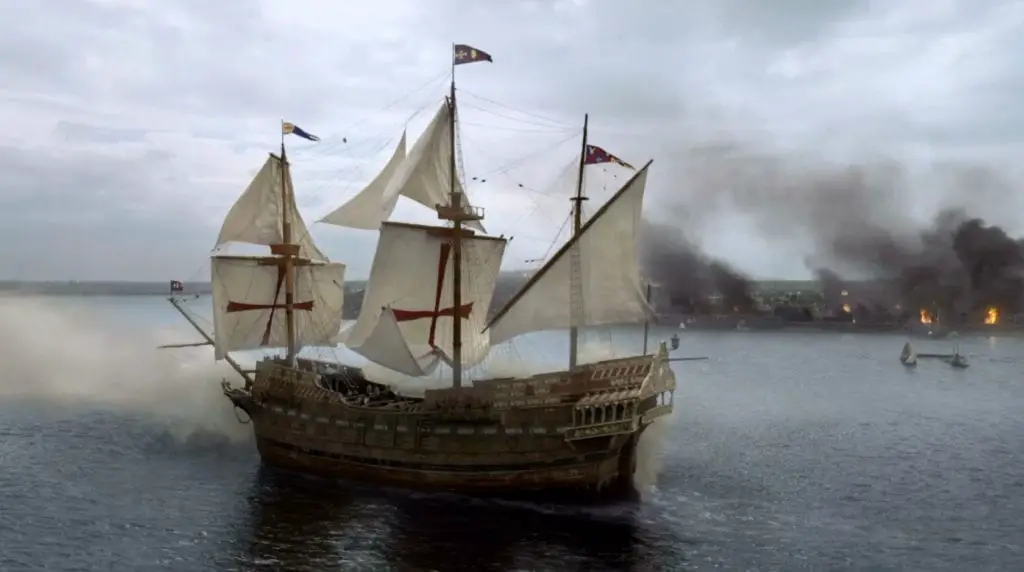
It’s brutal, terrible violence and death fitting the image of the bloodthirsty pirate to a tee. Ultimately there is no defending this moment or the death Flint orders. Yet to the audience it almost feels like justice. At the very least you understand exactly why he gave that order. Black Sails makes sure you understand by building piece by piece the monster that has become James Flint.
Now this show is far from the first to do this with a main character, of course. The Sopranos popularized the anti-hero drama through Tony Soprano. Breaking Bad showed every step of Walter White’s descent. No, I won’t pretend Black Sails is special for James Flint (though he’s a remarkable character). What makes Black Sails special is the way this same care gets taken with so many characters.
Eleanor Guthrie, as de facto leader of Nassau in all three seasons, embodies this stunningly well. As do all the female characters, as Julia previously covered. Eleanor may rob, steal, kill, and betray seemingly everyone who ever sides with her, but her motives never stray from the single goal of realizing the full potential of Nassau. You learn her every motivation and the monster that is her father. Anne Bonny unrepentantly lives a life of piracy, but her most brutal murders all tie back to the monster that is the man she married at thirteen and her emotional dependence on Jack Rackham for taking her away from that life. Her violent reaction to Rackham’s betrayal may be monstrous, but you don’t ever doubt the emotions behind that reaction.
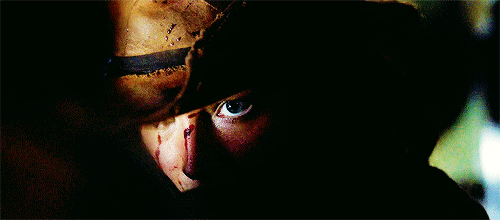
Charles Vane may be vicious bastard, but he also clings desperately to the pirate lifestyle out of a desire for freedom, having lived as a slave in his youth. Jack Rackham may be a condescending prick with a massive ego, but that ego was born because he saw corruption destroy his father’s good name, creating a desperate need for Jack to make his family name mean something again. To all these main characters, England and Spain are the monsters haunting their lives and driving them to piracy. They represent slavery, abuse, or corruption which at some point has threatened to permanently ruin their lives.
The minor characters are rarely treated differently, either. While certainly more susceptible to EVUHL-ness (see Hamund in season one, which did struggle quite a bit at times), most have the same complicated nature and motivations as the main characters. Flint’s crew constantly struggles between the worst acts of pirate life and the larger dreams of their captains. You might dislike the sex workers conning Jack Rackham while completely understanding the uncertainty driving them to do so. Very, very few characters act without realistic motivation, and those motivations appeal to you. Their monsters are also made clear.
Even Nassau as a whole garners sympathy. As you’d expect from a place inhabited and governed by pirates, Nassau is a violent, unstable place. Alliances come and go. Power shifts. Loyalties change. The two most influential captains try to kill each other one episode and become partners in the next. Murderers and rapists perform vile acts. The whole place feels like hell. Especially during season 1, you think Nassau beyond redemption. Then the British arrive with pardons and promises of a better life and that perception gets tossed on its head, even if temporarily. It proves that whatever crimes the pirates of Nassau commit, they do wish for easier lives. It also shows that Nassau fears their own monster. Because make no mistake, these men and women fear the British down to their very core.

This applies not only to bad characters the audience can relate to, but groups and characters with moral high ground but immoral methods. The escaped slaves in season 3 have every reason for the audience to root for them. Escaped slaves seeking only freedom in secrecy? What’s there to dislike? When they capture Flint’s crew, at this point unapologetically awful and punishing the innocent, it should be obvious who you side with. Flint is unquestionably a threat, threatening to bring the many dangers existing in these former slaves’ lives descending upon their hard-earned slice of freedom.
Except Black Sails by this point has put in considerable work to garner your sympathy towards characters like Billy Bones and John Silver. When the Maroons start torturing and killing the captured pirates, it’s easy to look at them as wrong despite all the circumstances suggesting otherwise. It’s truly a question of who the bigger monster is; the pirates who may expose the island, or the men and women slaughtering them without remorse. You’re left not with an easy divide between good and bad but between two sides with questionable methods. However terrible the Maroons’ methods, the reasons are easily relatable. Despite the justifiable risk posed to them by Flint’s crew, we know them too well to be okay with their deaths.
Again, Black Sails is far from the first or only show to make people understand a monster. The Sopranos did it. The Wire did it. The Shield did it. Breaking Bad, Deadwood, the list goes on and on. The difference between Black Sails and those shows (or any other I’ve seen) is not the moral grey of the characters, but rather the way the story is told. Tony Soprano may be a bad guy, but he’s still the protagonist the audience roots for. Same with Walter White in Breaking Bad. However despicable their actions, that never really changed. Never did the show itself call into question just who the audience roots for.
Going into the final season of Black Sails, there are at least three distinct sides to root for. Maybe even four, if one thinks Jack and Anne are their own side. Actually, that might stretch to five if you think the escaped slaves currently on Flint’s side will oppose him at some point.

Black Sails manages truly something special in this regard. Most shows that attempt something like this end up with the previously mentioned problem of audience apathy. Others can’t handle the balance between the characters and settle on someone as the good guy. It seems inevitable at some point that a story settles on someone for the audience to cheer. Probably the closest thing to this in Black Sails is Flint, who the audience was definitely meant to root for in season 1. After that, though? I think Black Sails went to great lengths to vilify him. Going into the final season he might end up as the main villain.
So many shows might try to do the same. Breaking Bad did want you to think of Walter White as an awful person, for example. Whatever the intention, though, the narrative never stopped treating him as the hero. The Wire may have put in considerable ground work to contextualize the existence of brutal drug dealers like Marlo Stanfield, while also creating villains within the police force chasing him, but the police never stopped being the good guys.
The same can’t be said of Black Sails. Flint may be the main character, but the show has created considerable space to root against him. Whether you’re rooting for John Silver to supplant him, the British to defeat him, the Maroons or Jack Rackham to double-cross him, there are many ways to view Flint as the bad guy. Woodes Rogers may generally be a good guy with good intentions for Nassau on behalf of the British, but he cheats on his wife, falls blindly in line with Eleanor’s questionable methods, and represents every fear the pirates of Nassau harbor. John Silver may be ridiculously charismatic and likeable, but he’s quite selfish and quick to do terrible things.
That’s not to say the show makes apologies for its characters, either, which is another trap so many stories fall into while humanizing bad people. Anne Bonny, for example, is easy to make every apology in the world for. However, Bonny herself makes none. The abuse she suffered as a child is not meant to excuse her, and Bonny does not use it as a sob story to justify her crimes. That past only serves as reasoning, not an apology. Anne also thrives on violence and murders without just cause. She is a pirate, and a damn good one at that.
So many shows would use her past to blame everything she does. They would have Anne Bonny give tearful monologues in the aftermath of murders. They would make Billy Bones an unproblematic cinnamon roll to further vilify Flint. Or have Eleanor focus constantly on her father in attempt to dismiss or apologize for her behavior. All too often stories do this and end up creating room for apology where there should be none. Vane ends up in a world of standom because he’s hot and loves Eleanor, so we end up with an audience who excuses the rapist or the murderer.
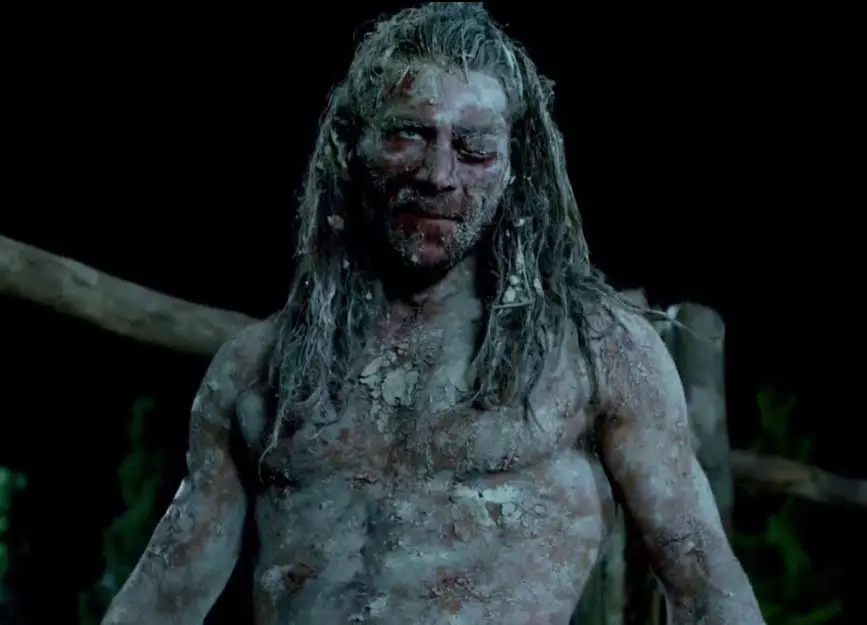
Black Sails avoids all of this, and just lets its characters live with messy emotional states. No one is born an evil person, or just decides one day to start living a life killing and stealing. An avalanche of moments throughout their life carries them to those moments. A single decision gets made which leads to another decision later, and on and on until they find themselves in chains or swinging from a noose. For most stories the reason behind those decisions don’t matter. Or they only matter for one or two characters. Walter White’s journey to darkness matters and Gus Fring’s not so much. We don’t know what drives Joffrey Baratheon to become a cruel child (unless you’ve read the books, of course).
It doesn’t matter why they became monsters or who their monsters are.
Black Sails takes a different approach. It takes the time to build its monsters from the ground up. Bone by bone, bit by bit, decision by decision. It makes you understand their fears, the people who haunt their nightmares. And that approach makes for a better brand of monster which questions whether they are monsters at all. It also makes for one of the best shows I’ve ever seen.
